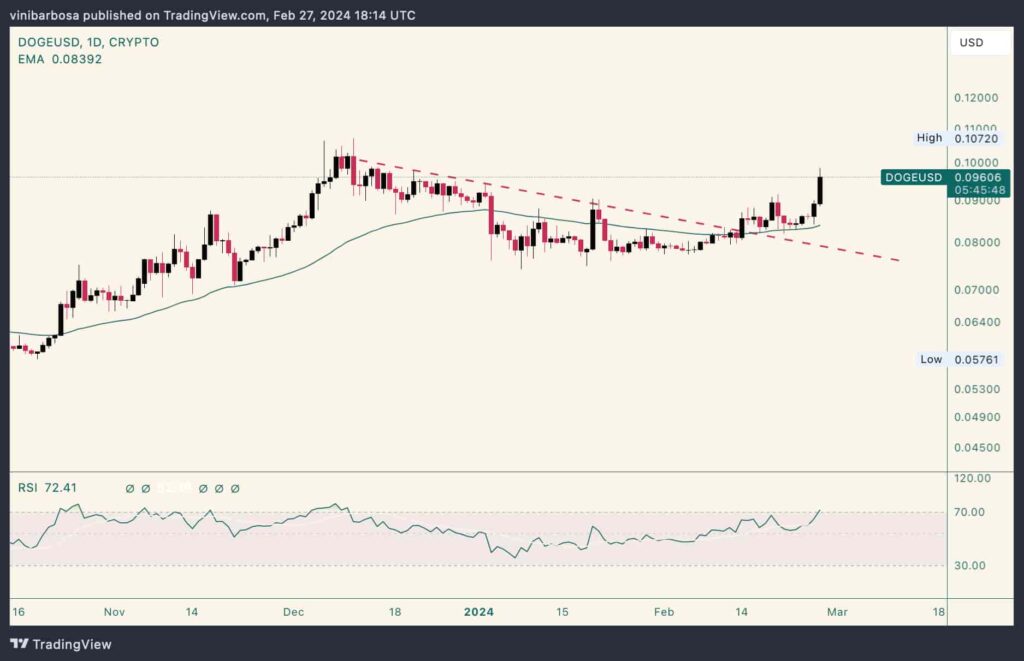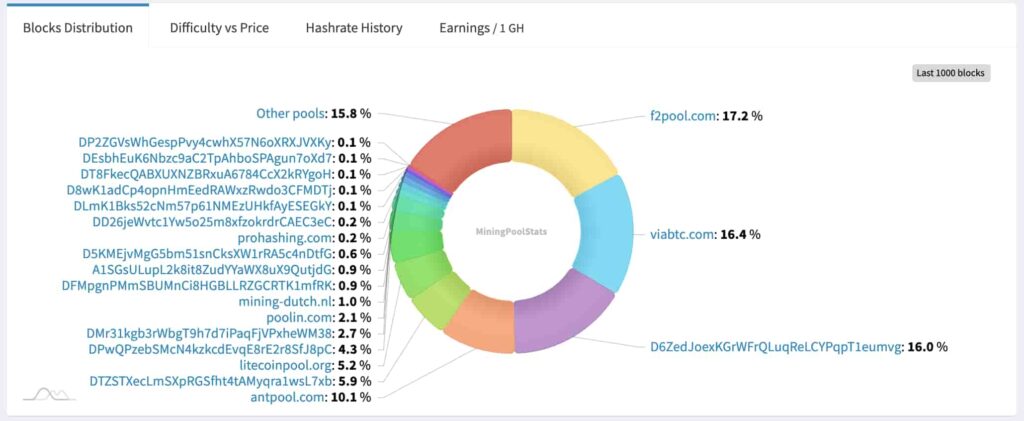Dogecoin’s (DOGE) price experienced a remarkable rally, boasting double-digit percentage gains in the last 24 hours and flirting with $0.1. This resulted in over 70% of its holders enjoying profits.
The cryptocurrency community is buzzing with excitement. Many investors, inspired by this surge, are now keenly exploring how to mine Dogecoin to capitalize on these gains.
Notably, Dogecoin uses the same mining algorithm as Litecoin (LTC), called Scrypt. This allows for merged mining between the two leading cryptocurrencies. Essentially, merged mining works by providing proof-of-work to a specialized mining pool and receiving both DOGE and LTC as a reward according to the produced hashrate.

DOGE/USD daily chart. Source: TradingView (Finbold)
As of writing, 71% of all Dogecoin holders are sitting on unrealized profits, according to IntoTheBlock data. This means that 71% of all addresses in the network acquired DOGE at lower prices than today’s level.

Dogecoin holders. Source: IntoTheBlock
How to mine Dogecoin using mining pools and Scrypt ASIC
Initially, anyone could competitively solo mine Dogecoin in their houses using gaming GPUs and profit from it. However, the network grew, and so did the competitiveness and the mining difficulty – requiring much more hashrate for lower rewards.
The merged mining surged as an extra incentive to improve the security of all Scrypt-based mining cryptocurrencies. In particular, Litecoin, a popular cryptocurrency focused on scalability for peer-to-peer payments. Now, miners can receive rewards in the two coins, hedging their mining.
Interestingly, mining DOGE with a GPU will hardly be profitable in the long term, considering infrastructure and energy costs. Like SHA-256 algorithm coins like Bitcoin (BTC), using Scrypt-ASICs is necessary to mine Dogecoin profitably.
Moreover, most miners will favor connecting to a mining pool. These businesses gather hashrate from their workers and distribute a payment according to the agreed payment model. Usually, Dogecoin mining pools use a variation of the Pay Per Share (PPS) model, proportionally rewarding each miner for the contributed hashrate used to find a valid block.
Therefore, if you want to start to mine Dogecoin, here is what you need to do:
Buy an Application-Specific Integrated Circuits (ASIC) for the Scrypt algorithm;Connect the ASIC to a power source, a computer, and an Ethernet cable;Configure private Dogecoin and Litecoin wallets to receive the rewards;Sign in for a mining pool of your choice, considering fees, the payment model, and other personal preferences that will impact your experience and results;Provide the requested information and follow the mining pool steps;Start to mine Dogecoin.What happens if you mine Dogecoin with the largest pools?
On that note, miners usually join one of the largest pools to increase their chances of finding valid blocks. This has the expected trade-off of lowering the individual reward per each block mined.
Nevertheless, if you mine Dogecoin with the largest pools, you will achieve higher predictability and constancy in the payments. Mining is an inherently unpredictable activity, but miners can mitigate that by increasing their individual chances while decreasing the hashrate share.
Thus, joining the largest pools will inevitably decrease the network’s decentralization, lowering its security. Currently, the four largest pools control nearly 60% of the entire hashrate, which is undesirable for a proof-of-work system. Still, this is higher than Bitcoin’s two controlling pools for a similar network share, according to MiningPoolStats data.

Dogecoin block distribution. Source: MiningPoolStats
All things considered, mining Scrypt cryptocurrencies has its risks, benefits, and trade-offs, like any business. Wanna-be miners must do proper research and understand the details of their activity before investing time and money to mine Dogecoin.
Disclaimer: The content on this site should not be considered investment advice. Investing is speculative. When investing, your capital is at risk.















